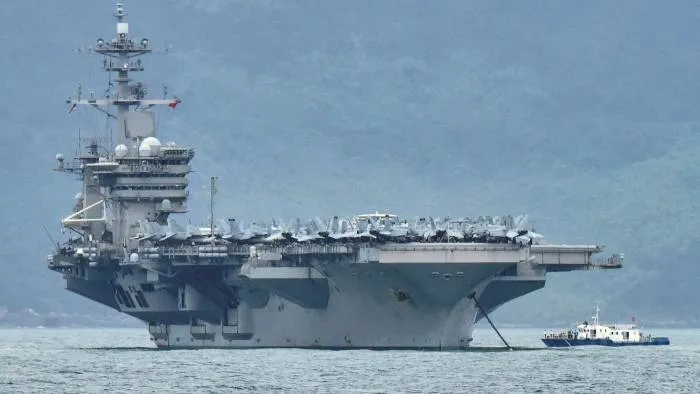
Chinese military aircraft simulated missile attacks on a nearby US aircraft carrier during an incursion into Taiwan’s air defence zone three days after Joe Biden’s inauguration, according to intelligence from the US and its allies.
The People’s Liberation Army sent 11 aircraft into the south-western corner of Taiwan’s air defence zone on January 23, and 15 aircraft into the same area the next day, according to Taiwan’s defence ministry.
People familiar with intelligence collected by the US and its allies said the bombers and some of the fighter aircraft involved were conducting an exercise that used a group of US Navy vessels led by the carrier USS Theodore Roosevelt in the same area as a simulated target.
Pilots of H-6 bombers could be heard in cockpit conversations confirming orders for the simulated targeting and release of anti-ship missiles against the carrier, the people said.
The revelations highlight that the intense military competition between the two superpowers around Taiwan and the South China Sea has not eased, posing a challenge to any attempts the Biden administration might make to improve its relationship with Beijing.
China’s development of missiles capable of targeting US ships and aircraft in the region has helped counter America’s military dominance in Asia and the western Pacific. Although Chinese experts have said that Beijing remains unwilling to risk open conflict with the US, the PLA’s new muscle is forcing the US to adjust its posture and strategy in Asia.
The area where Taipei reported the incursions last weekend is located between Pratas, a Taiwan-held atoll in the northern part of the South China Sea, and Taiwan proper, where the Taiwan Strait meets the Bashi Channel, a main passageway between the western Pacific and the South China Sea.
“The Su-30 [fighters] can carry Kh-31 anti-ship missiles, and the H-6 bombers and J-16 fighters can both carry YJ anti-ship missiles,” said Su Tzu-yun, an analyst at the Institute for National Defense and Security Research, a think-tank backed by Taiwan’s defence ministry. “All three aircraft are clearly a display of threat against surface ships.”
The US Indo-Pacific Command said on January 23 that the US carrier strike group had sailed into the South China Sea that day. According to ship-tracking data, it passed through the Bashi Channel.
The Chinese aerial manoeuvres sparked a strong response from the new US administration, which warned Beijing to stop intimidating Taiwan.
“We urge Beijing to cease its military, diplomatic and economic pressure against Taiwan,” the US state department said, before adding that China should remember that Washington’s relationship with Taipei was “rock solid”.
Mr Biden sent another message to China reaffirming the US commitment to help Japan defend the Senkaku Islands, which are administered by Tokyo but claimed by Beijing, which calls them the Diaoyu.
China experts in Washington expect that Mr Biden will adopt a less chaotic approach than former president Donald Trump in setting policy.
In an early sign that relations between Washington and Beijing would remain tense over Taiwan and a range of other issues, Antony Blinken, the new US secretary of state, this week said he agreed with the Trump administration, which had said the Chinese government’s repression of Uighur Muslims in detention camps in Xinjiang province was “genocide”.
In his confirmation hearing last week, Mr Blinken said that while he disagreed with how Mr Trump had implemented his policies towards China, he was “right in taking a tougher approach”.
According to an announcement by China’s Maritime Safety Administration, the PLA is conducting another exercise in the South China Sea, which is due to wrap up on Saturday. Taiwan’s defence ministry has reported larger than average Chinese air incursions into its air defence zone since that latest exercise started on Wednesday.




















